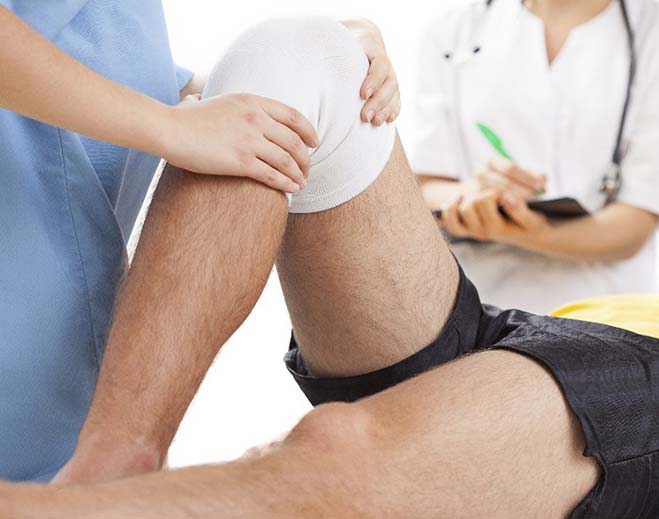Joint Replacement
Millions of Americans suffer from pain and loss of movement due to damaged joints caused by arthritis and other ailments. When we suffer from joint pain, our movement can become extremely limited, and everyday activities may become a challenge.
Arthroplasty May Provide Pain Relief
If other treatments fail to provide relief, the doctors at Piedmont Medical Center can help you determine if joint replacement surgery may be an option for you. Located in Rock Hills, South Carolina, Piedmont Medical Center has a team of skilled orthopedic
physicians, physical therapists, surgeons and nurses that can provide you with a recommended course of action to help you live healthily and independently.
What Is Arthroplasty?
Arthroplasty is the repair of a joint via surgery. It involves replacing and reconstructing damaged joints using plastic, metal or ceramic prostheses. With arthroplasty, the prosthesis implant can replicate the function of a typical joint.
This operation may be a treatment option for a patient who has already tried nonsurgical treatments to no avail. Arthroplasty can be a partial or total joint replacement surgery. The knee and hip are the most commonly replaced in arthroplasty, but arthroplasty
can also be performed on other joints.
What Is an Artificial Joint Replacement?
Artificial joint replacement is just another term for arthroplasty. While an artificial joint replacement can be performed on the elbow, ankle, hand, wrist, spine and feet, the most common arthroplasties are performed on the knees, hips and shoulders.
Most joints are divided into two or three parts. The knee has three: the medial, lateral and kneecap. On the other hand, shoulder and hip joints have a ball-and-socket structure, thus only having two parts.
In knee arthroplasty, the surgeon will replace the damaged bone or cartilage with a prosthesis. The American Academy of Orthopaedic Surgeons (AAOS) reported that more than 90% of total knee replacements still function 15 years after the operation.
Hip joint replacement or shoulder arthroplasty involves removing the damaged ball or socket and replacing it with a metal ball attached to a stem. This prosthesis will be placed into the hip or shoulder joint’s hollow center.
Depending on the severity of joint damage, a doctor might recommend partial or total replacement to a patient. A partial artificial joint replacement may be suitable for an individual with a fracture, isolated arthritis or diseased proximal humerus or
femur that does not involve the shoulder or hip socket. Otherwise, the patient might undergo total joint replacement.
What Is A Knee Replacement?
When the knee’s articular cartilage becomes damaged, moving the knees becomes painful. It is because the bones are rubbing together instead of gliding over each other. Knee replacement surgery can restore mobility and ease the pain of patients whose
knees have degenerated due to rheumatoid arthritis, osteoarthritis or post-traumatic arthritis.
Also known as knee arthroplasty, this procedure aims to ease pain and regain movement in the knee using a prosthesis. It may be recommended for patients who have a
- Deformed knee
- Moderate knee pain that persists even while resting or sleeping
- Chronic knee swelling or inflammation that medication or rest cannot improve
- Severe pain or stiffness in the knee that prevents them from performing everyday activities
Multiple studies have reported excellent survivorship rates and results from total knee replacement. With total knee arthroplasty, both sides of the knee joint will be replaced. The operation can last up to 3 hours. After a total knee arthroplasty, the
patient may have better movement and less pain, but scar tissue will remain, making it difficult to bend and move the knee.
On the other hand, a partial knee replacement will only replace one knee joint side. A patient will get to keep more of their natural tissue, bone and ligaments than a total knee replacement surgery patient. Partial knee replacement is recommended for
individuals who damaged a single part of the knee. Since it is less invasive, a partial knee replacement surgery patient may have a shorter hospital stay, quicker recovery and a higher chance to regain more natural movement.
Preparing for Your Orthopedic Surgery
Depending on your medical assessment, your health condition can affect your surgery outcome.
Please alert your doctor if you have any of the following chronic conditions:
- Anemia
- Hypertension or high blood pressure
- Opioid or narcotic drug use
- Varicose veins, leg swelling and blood clots
Work with your surgeon and primary care team to keep yourself in the best health condition possible. A healthy diet is crucial for recovery, so we recommend following a balanced diet before and after surgery. Since chronic joint pain may have reduced
your physical activity, ask your surgeon about any exercises you can perform to regain your strength before surgery.
Smokers and obese individuals are at a greater risk of complications after orthopedic surgery. These complications include stroke, heart attack, wound infections, blood clots and pneumonia. Your doctor may recommend getting you checked for sleep apnea,
a medical disorder that can make your breathing irregular while sleeping. Undiagnosed sleep apnea can put you at greater risk of complications in the heart during your recovery from surgery. Other conditions that can affect the surgery include:
- Depression
- Memory impairments
- Movement disorders
- Staph infections
Two weeks before your surgery, do not shave the area where the incision will be done. On your surgery day, wash this area with chlorhexidine soap which you can buy over the counter. You can also use this soap when you return home.





